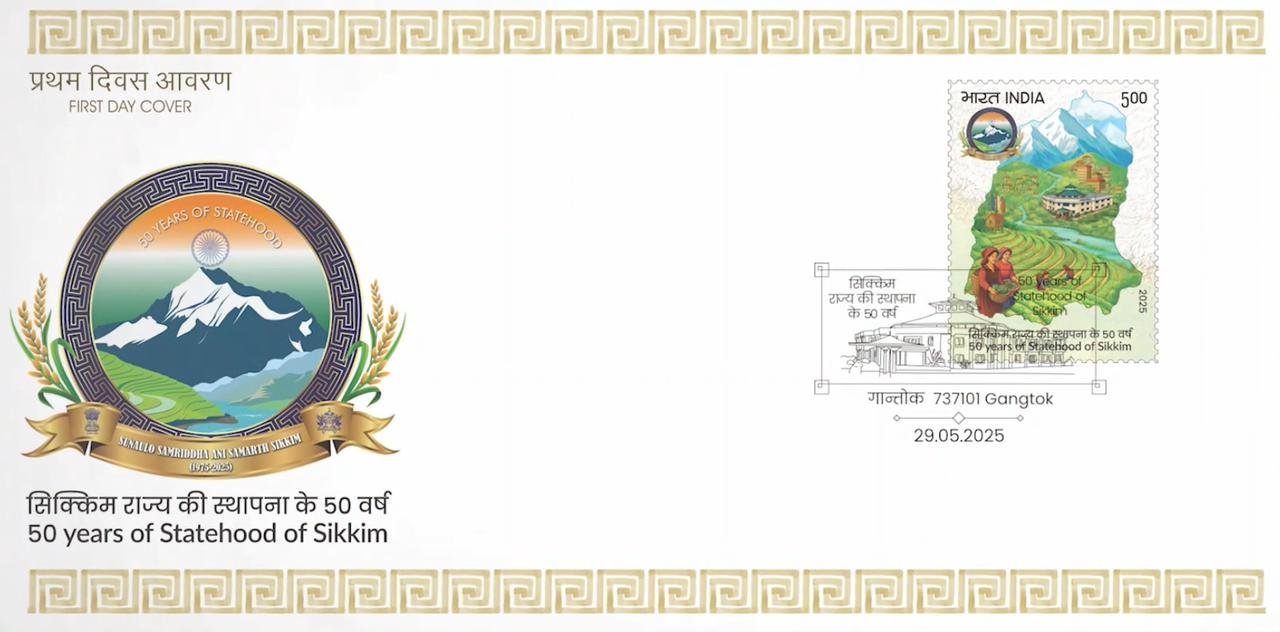50 Years of Sikkim Statehood

Technical Data
| Date of Issue | May 29, 2025 |
|---|---|
| Denomination | Rs. 5 |
| Quantity | 305,757 |
| Printer | Security Printing Press, Hyderabad |
| Printing Process | Wet Offset |
| Colors | Multicolor |
| Credit (Designed By) | Shri Kamleshwar Singh |
| Catalog Codes |
Colnect codes IN 2025.05.29-01 |
| Themes | Landscapes | Maps | Plantations |
Sikkim Statehood 50 Years Stamp – Celebrating a Golden Journey
The State of Sikkim is a land like no other—where tradition and modernity blend seamlessly, where rivers sing folklore, and where the Himalayas guard timeless stories. Known for its natural beauty, cultural harmony, and progressive spirit, Sikkim has always stood out as one of India’s most unique regions.
From Monarchy to Democracy
In 1975, Sikkim became the 22nd state of India, transitioning from a monarchy to a democracy. Since then, its 32-member legislative assembly has ensured fair governance and active citizen participation. The journey from royal rule to people’s power remains one of the defining moments of Sikkim’s history.
Land of Rivers and Mountains
The Teesta and Rangeet rivers flow gracefully through Sikkim’s hills, providing water for life and agriculture, while inspiring countless local legends. Overlooking them all is the majestic Mount Khangchendzonga, India’s tallest peak, regarded as a guardian spirit by the people of Sikkim.
Biodiversity Paradise
Sikkim is home to remarkable biodiversity, with 82.31% forest cover and thousands of plant and animal species. Over 4,500 flowering plants, 532 orchids, 28 bamboo species, and 300 ferns make it a botanist’s delight. The red panda, snow leopard, musk deer, and more than 600 bird species thrive here. Recognizing this richness, Khangchendzonga National Park became India’s first Mixed World Heritage Site in 2016.
Pioneer of Organic Farming
Sikkim made history by becoming India’s first fully organic state, blending traditional farming with modern scientific methods. This revolution not only safeguarded the environment but also boosted eco-tourism and sustainable livelihoods. Village homestays, monastery visits, and heritage walks offer travelers a respectful, authentic way to experience Sikkim.
Harmony of Tradition and Innovation
Today, Sikkim balances progress with preservation. Solar-powered homes coexist with centuries-old monasteries. Knowledge centers thrive alongside digital governance. Young entrepreneurs, conservationists, and cultural curators are shaping new futures without losing touch with their roots.
Golden Jubilee of Statehood
The year 2025 marks 50 years of Sikkim’s statehood, a celebration of its resilience, values, and progress. From the first hoisting of the Indian flag in Gangtok to the preservation of Lepcha, Bhutia, and Nepali languages, Sikkim has shown the world that development and identity can go hand in hand.
The Commemorative Stamp
To honor this milestone, the Department of Posts has issued the Sikkim Statehood 50 Years Stamp. This special philatelic tribute captures the spirit of a small yet extraordinary state that has contributed immensely to India’s diversity. It symbolizes five decades of unity, sustainable growth, and cultural pride.
The Sikkim Statehood 50 Years Stamp is not just a collector’s gem—it’s a reminder of how a tiny Himalayan state became a global example of harmony, sustainability, and progress.
First Day Cover


Leave a Comment
You must be logged in to post a comment.